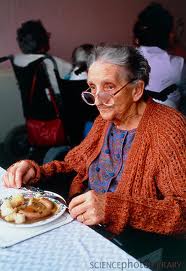I continued talking to Naomi, my assigned hospice patient, and assisting her while monitoring others at the table. I noticed that Petra had not touched any of her food. Petra was not a very independent eater, but I knew she was physically capable of feeding herself by any means necessary.
“Petra, your food is just sitting there getting cold. You have a whole tray of delicious things to eat. You should eat some and see how good it is. You’re a good eater. Eat your food.”
“Food? What food? I don’t have none.”
“The food on this tray is all for you, Petra. This is your food tray right in front of you. Watch me point to each item. You have coffee, juice, milk, mashed potatoes, fish, broccoli, bread, and fruit. That’s your name spelled P-e-t-r-a.”
“That’s not my name. My name is Petra. That’s somebody else’s name. That’s not my name. I know my name.”
“Well, that is still your food on the tray. You should eat before it gets cold. Go ahead and eat. Give it a try.”
“Eat? Eat what?”
“Your food, Petra, your fish, potatoes, and everything else.”
“Fish? What fish? I don’t have none. Do you see a fish here? I don’t see a fish. I don’t have none.”
From previous experience, I knew that Petra and I could go on roaming forever around this same circle. Fortunately, she was sitting next to me. I gave her a taste of the fish first because I knew she liked it. Then I placed her fork in her hand and started her off eating. I did this in steps by steering her hand and giving her directions on putting food into her mouth, chewing, and swallowing. Residents with dementia often needed tasks broken into simple steps. Usually, she ate for a while by herself, even with her hands, once I started her off. But without any help getting started, she would sit and look at the food she said was not there. My other hand continued to assist Naomi, the resident assigned to me. My eyes monitored everybody at the table.
“Don’t do that! Leave my food alone! Get your nasty hands off my plate! Help! Can somebody help me?” screamed a resident at our table as if she were under attack. All the nurse aides were occupied feeding residents at other tables and experiencing their own mealtime problems. As the unofficial table captain, I told Roscoe sternly to leave Charlena’s food alone. He gave me a confused look, pretended he didn’t know what I was talking about, but betrayed himself with a silly grin he thought I didn’t see. I leaned across the table and directed his attention to his own plate by putting his spoon in his food. He picked up his spoon and started eating again. Then I reassured Charlena that everything was okay, and she could finish eating. Charlena smiled with an air of triumph. Roscoe was in trouble, and she enjoyed knowing she helped to get him there.
Rita had been watching me help Naomi and Petra eat. Imitating me, she was attempting to feed George, but with her own used utensils. George had his mouth open obligingly to help. I interceded before any damage was done. By this time, several residents had spilled food on the table or the floor and had food stains on their bibs. Petra had to be restarted twice to eat the food she insisted she had never received. I had stood to lean across the table twice to settle other table disputes involving food and different residents.
Naomi ate quietly during all the interruptions. I had been giving her ongoing praise on how well she was doing. I also praised others at the table when they did well. They savored the attention, and Naomi wasn’t the least bit jealous. She had already told them that I was her guest and even offered me food which I declined. I had not gone there to eat and could not think about eating if I had.
When one resident was praised, another would often say, “Look at me! I’m eating, too!” This reminded me of students at my PK-eighth grade school. They said the same thing when someone else was praised. I laughed, thinking the world was a universal classroom. Maybe the stars in the sky were created to be placed on foreheads of people around the world when they did something praiseworthy.
© Frances Shani Parker, Author, Becoming Dead Right: A Hospice Volunteer in Urban Nursing Homes
Frances Shani Parker, Author


